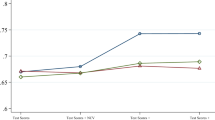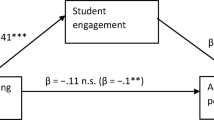Abstract
This study investigated differences in university students’ academic entitlement (AE) by demographic group (sex, college class, college generational status) as well as AE’s relationship with self-efficacy for college coursework and social networking. It also investigated predictors of AE in first-generation (FG) students and continuing-generation (CG) students. Participants were 313 undergraduates at a south-central U.S. university. Males reported significantly greater AE than females. No differences in AE were found by college class or generational status. AE was significantly correlated with college course self-efficacy and social network use. College course self-efficacy, sex, and social network use predicted AE in CG students; however, in FG students, AE was predicted by college course self-efficacy alone. Implications for future research are presented.
Similar content being viewed by others
References
Achacoso, M. V. (2002). “What do you mean my grade is not an A?” An investigation of academic entitlement, causal attributions, and self-regulation in college students. Doctoral dissertation. Retrieved from http://repositories.lib.utexas.edu/handle/2152/2486.
Bandura, A. (1977). Self-efficacy: Toward a unifying theory of behavioral change. Psychological Review, 84, 191–215. Retrieved from http://www.apa.org/pubs/journals/rev/.
Billson, J. M., & Terry, M. B. (1982). In search of the silken purse: Factors in attrition among first generation students. Paper presented at the meeting of the Association of American Colleges, Denver, Colorado.
Bong M., Skaalvik E. M. (2003) Academic self-concept and self-efficacy: How different are they really?. Educational Psychology Review 15(1): 1–40. doi:1040-726X/03/0300-0001/0
Buffardi L., Campbell W. (2008) Narcissism and social networking web sites. Personality & Social Psychology Bulletin 34(10): 1303–1314. doi:10.1177/0146167208320061
Bylsma W. H., Major B. (1992) Two routes to eliminating gender differences in personal entitlement. Psychology of Women Quarterly 16: 193–200. doi:10.1111/j.1471-6402.1992.tb00249.x
Campbell W. K., Bonacci A. M., Shelton J., Exline J. J., Bushman B. J. (2004) Psychological entitlement: Interpersonal consequences and validation of a self-report measure. Journal of Personality Assessment 83(1): 29–45. doi:10.1207/s15327752jpa8301_04
Chowning K., Campbell N. J. (2009) Development and validation of a measure of academic entitlement: Individual differences in students’ externalized responsibility and entitled expectations. Journal of Educational Psychology 101(4): 982–997. doi:10.1037/a0016351
Choy S. P. (2001) Access and persistence: Findings from 10 years of longitudinal research on students. American Council on Education Center for Policy Analysis, Washington, DC
Ciani K. D., Summers J. J., Easter M. A. (2008) Gender differences in academic entitlement among college students. The Journal of Genetic Psychology 169(4): 332–344. doi:10.3200/GNTP.169.4.332-344
D’Allegro, M. L., & Kerns, S. (2010–2011) Is there such a thing as too much of a good thing when it comes to education? Reexamining first generation student success. Journal of College Student Retention, 12(3), 293–317. doi:10.2190/CS.12.3.c.
Desmarais S., Curtis J. (1997) Gender differences in pay histories and views on pay entitlement among university students. Sex Roles 37(9/10): 623–642. doi:10.1007/BF02936332
Desmarais, S., & Curtis, J. (2001). Gender and perceived income entitlement among full-time workers: Analyses for Canadian national samples, 1984 and 1994. Basic and Applied Social Psychology, 23(3), 157–168. Retrieved from http://www.tandf.co.uk/journals/titles/01973533.asp.
DeWitz S., Woolsey M., Walsh W. (2009) College student retention: An exploration of the relationship between self-efficacy beliefs and purpose in life among college students. Journal of College Student Development 50(1): 19–34. doi:10.1353/csd.0.0049
Engle, J., Bermeo, A., & O’Brien, C. (2006). Straight from the source: What works for first-generation college students. Pell Institute for Study of Opportunity in Higher Education. Retrieved from http://www.pellinstitute.org/.
Gibbons, M. M., & Borders, L. D. (2010). Prospective first-generation college students: A social-cognitive perspective. Career Development Quarterly, 58, 194–208. Retrieved from http://www.ncda.org/.
Greenberger E., Lessard J., Chen C., Farraggia S. P. (2008) Self-entitled college students: Contributions of personality, parenting, and motivational factors. Journal of Youth Adolescence 37: 1193–1204. doi:10.1007/s10964-008-9284-9
Hill, M. S., & Fischer, A. R. (2001). Does entitlement mediate the link between masculinity and rape-related variables? Journal of Counseling Psychology, 48(1), 39–50. Retrieved from http://www.apa.org/pubs/journals/cou/.
Hogue M., Yoder J., Singleton S. (2007) The gender wage gap: An explanation of men’s elevated wage entitlement. Sex Roles 56(9/10): 573–579. doi:10.1007/s11199-007-9199-z
Ishitani T. T. (2006) Studying attrition and degree completion behavior among first-generation college students in the United States. The Journal of Higher Education 77(5): 861–885. doi:10.1353/jhe.2006.0042
Jackson, L. A., Gardner, P. D., & Sullivan, L. A. (1992). Explaining gender differences in self-pay expectations: Social comparison standards and perceptions of fair pay. Journal of Applied Psychology, 77(5), 651–663. Retrieved from http://www.apa.org/pubs/journals/apl/index.aspx.
Jayson, S. (2009, August 25). Are students today more narcissistic? USA Today. Retrieved from http://www.usatoday.com/.
Landesman, C. (2010, May 17). The age of narcissism. Daily Mail (London). Retrieved from http://www.dailymail.co.uk/.
LaPorta, L. D. (2009, November). Twitter and Youtube: Unexpected consequences of the self-esteem movement? Psychiatric Times, 26(11), 1–8. Retrieved from http://www.psychiatrictimes.com/.
Lippmann S., Bulanda R. E., Wagenaar T. C. (2009) Student entitlement: Issues and strategies for confronting entitlement in the classroom and beyond. College Teaching 57(4): 197–204. doi:10.3200/CTCH.57.4.197-204
McConnell, P. J. (2000). ERIC review: What community colleges should do to assist first generation students. Community College Review, 28(3), 75–87. Retrieved from http://crw.sagepub.com/.
Mehdizadeh S. (2010) Self-presentation 2.0: Narcissism and self-esteem on Facebook. Cyberpsychology, Behavior and Social Networking 13(4): 357–364. doi:10.1089/cyber.2009.0257
Murphy, C. G., & Hicks, T. (2006). Academic characteristics among first-generation and non-first-generation college students. College Quarterly, 9(2). Retrieved from http://www.collegequarterly.ca/.
Nunez, A., & Cuccaro-Alamin, S. (1998). First generation students: Undergraduates whose parents never enrolled in postsecondary education. Washington, DC: U.S. Department of Education, National Center for Education Statistics. Retrieved from http://nces.ed.gov/.
Pajares F. (1997) Current directions in self-efficacy research. In: Maehr M., Pintrich P. R. (eds) Advances in motivation and achievement. JAI Press, Greenwich, CT, pp 1–49
Pike, G. R., & Kuh, G. D. (2005). First- and second-generation college students: A comparison of their engagement and intellectual development. The Journal of Higher Education, 76(3), 276–300. Retrieved from http://www.ohiostatepress.org/Journals/JHE/jhemain.htm.
Prospero M., Vohra-Gupta S. (2007) First-generation college students: Motivation, integration, and academic achievement. Community College Journal of Research and Practice 31: 963– 975. doi:10.1080/10668920600902051
Pryor L., Miller J., Gaughan E. (2008) A comparison of the psychological entitlement scale and the narcissistic personality inventory’s entitlement scale: Relations with general personality traits and personality disorders. Journal of Personality Assessment 90(5): 517–520. doi:10.1080/00223890802248893
Singleton-Jackson J., Jackson D., Reinhardt J. (2010) Students as consumers of knowledge: Are they buying what we’re selling?. Innovative Higher Education 35: 343–358. doi:10.1007/s10755-010-9151-y
Solberg V. S., O’Brien K., Villareal P., Kennel R., Davis B. (1993) Self-efficacy of Hispanic college students: Validation of the college self-efficacy instrument. Hispanic Journal of Behavioral Sciences 15(1): 80–95
Solberg V. S., Villarreal P. (1997) Examination of self-efficacy, social support, and stress as predictors of psychological and physical distress among Hispanic college students. Hispanic Journal of Behavioral Sciences 19(2): 182–201
Teo, A. (2010, May 8). Meek-less in Twitverse: Twitter and its ilk have given rise to a generation that believes its every utterance ought to be shared with the world. The Business Times Singapore. Retrieved from http://www.thebusinesstimes.com.sg..
Terezini, P. T., Springer, L., Yaeger, P. M., Pascarella, E. T., & Nora, A. (1996). First-generation college students: Characteristics, experiences, and cognitive development. Research in Higher Education, 37, 1–22. Retrieved from http://www.aabri.com/rhej.html.
Twenge J. M. (2006) Generation me: Why today’s young Americans are more confident, assertive, entitled—and more miserable than ever before. Free Press, New York, NY
Twenge J. M., Campbell W. K. (2009) The narcissism epidemic: Living in the age of entitlement. Free Press, New York, NY
U.S. Department of Education. (1996). Application for grants under the student support services program. Washington, DC: Author.
Utz, S., & Kramer, N. (2009). The privacy paradox on social networking sites revisited: The role of individual characteristics and group norms. Cyberpsychology: Journal of Psychosocial Research on Cyberspace, 3(2), article 2. Retrieved from http://www.cyberpsychology.eu/index.php.
Author information
Authors and Affiliations
Corresponding author
Rights and permissions
About this article
Cite this article
Boswell, S.S. “I deserve success”: Academic entitlement attitudes and their relationships with course self-efficacy, social networking, and demographic variables. Soc Psychol Educ 15, 353–365 (2012). https://doi.org/10.1007/s11218-012-9184-4
Received:
Accepted:
Published:
Issue Date:
DOI: https://doi.org/10.1007/s11218-012-9184-4




